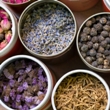Hochu-ekki-to (TJ 41)
Hochu-ekki-to (TJ 41)
Natural Standard Monograph, Copyright © 2013 (www.naturalstandard.com). Commercial distribution prohibited. This monograph is intended for informational purposes only, and should not be interpreted as specific medical advice. You should consult with a qualified healthcare provider before making decisions about therapies and/or health conditions.
Related Terms
Astragalus root, Atractylodes lancea rhizome, bupleurum root, cimicifuga rhizome, citrus unshiu peel, ginger rhizome, ginseng root, glycyrrhiza root, herbal therapy, herbs, Japanese angelica root, jujube fruit, Kampo, licorice, TJ 41, TJ 43, TCM, traditional Chinese medicine.
Background
Hochu-ekki-to is a mixture of ten raw Japanese herbs, which are mixed in set proportions. Japanese experts claim that Hochu-ekki-to will relieve fatigue, boost immunity, and help relieve the symptoms of chemotherapy. Currently, this herbal formula is being used in research to treat patients who are resistant to conventional forms of antibiotics. There is no English translation of Hochu-ekki-to.
The herbs in this formula include astragalus root, ginseng root, Atractylodes lancea rhizome, Japanese angelica root, bupleurum root, jujube fruit, citrus unshiu peel, glycyrrhiza root (licorice), cimicifuga rhizome, and ginger rhizome.
Theory/Evidence
Research on Hochu-ekki-to is more extensive than other Japanese herbal formulas. However, a majority of these studies have been performed on mice or human cell cultures rather than humans. One example of this was an article in the Journal of Rheumatology where Hochu-ekki-to suppressed arthritis in mice.
Based on these preliminary results, further human clinical trials are warranted because the available studies on humans have been sparse and as of yet, inconclusive. One study, published in 1994, found that this herbal prescription might help boost the immunological response in elderly persons. Regardless, the American Cancer Society states that very little evidence exists showing the efficacy of Hochu-ekki-to for any condition.
Author Information
This information has been edited and peer-reviewed by contributors to the Natural Standard Research Collaboration (www.naturalstandard.com).
Bibliography
Natural Standard developed the above evidence-based information based on a thorough systematic review of the available scientific articles. For comprehensive information about alternative and complementary therapies on the professional level, go to www.naturalstandard.com. Selected references are listed below.
American Cancer Society: Kampo. 10 May 2006. Prolotherapy.Com. 9 May 2006. www.cancer.org
Hai le X, Kogure T, Niizawa A, et al. Suppressive effect of hochu-ekki-to on collagen induced arthritis in DBA1J mice. J Rheumatol. 2002 Aug;29(8):1601-8. View Abstract
Kuroiwa A, Liou S, Yan H, et al. Effect of a traditional Japanese herbal medicine, hochu-ekki-to (Bu-Zhong-Yi-Qi Tang), on immunity in elderly persons. Int Immunopharmacol. 2004 Feb;4(2):317-24. View Abstract
Copyright © 2013 Natural Standard (www.naturalstandard.com)
The information in this monograph is intended for informational purposes only, and is meant to help users better understand health concerns. Information is based on review of scientific research data, historical practice patterns, and clinical experience. This information should not be interpreted as specific medical advice. Users should consult with a qualified healthcare provider for specific questions regarding therapies, diagnosis and/or health conditions, prior to making therapeutic decisions.
Updated:
March 22, 2017
